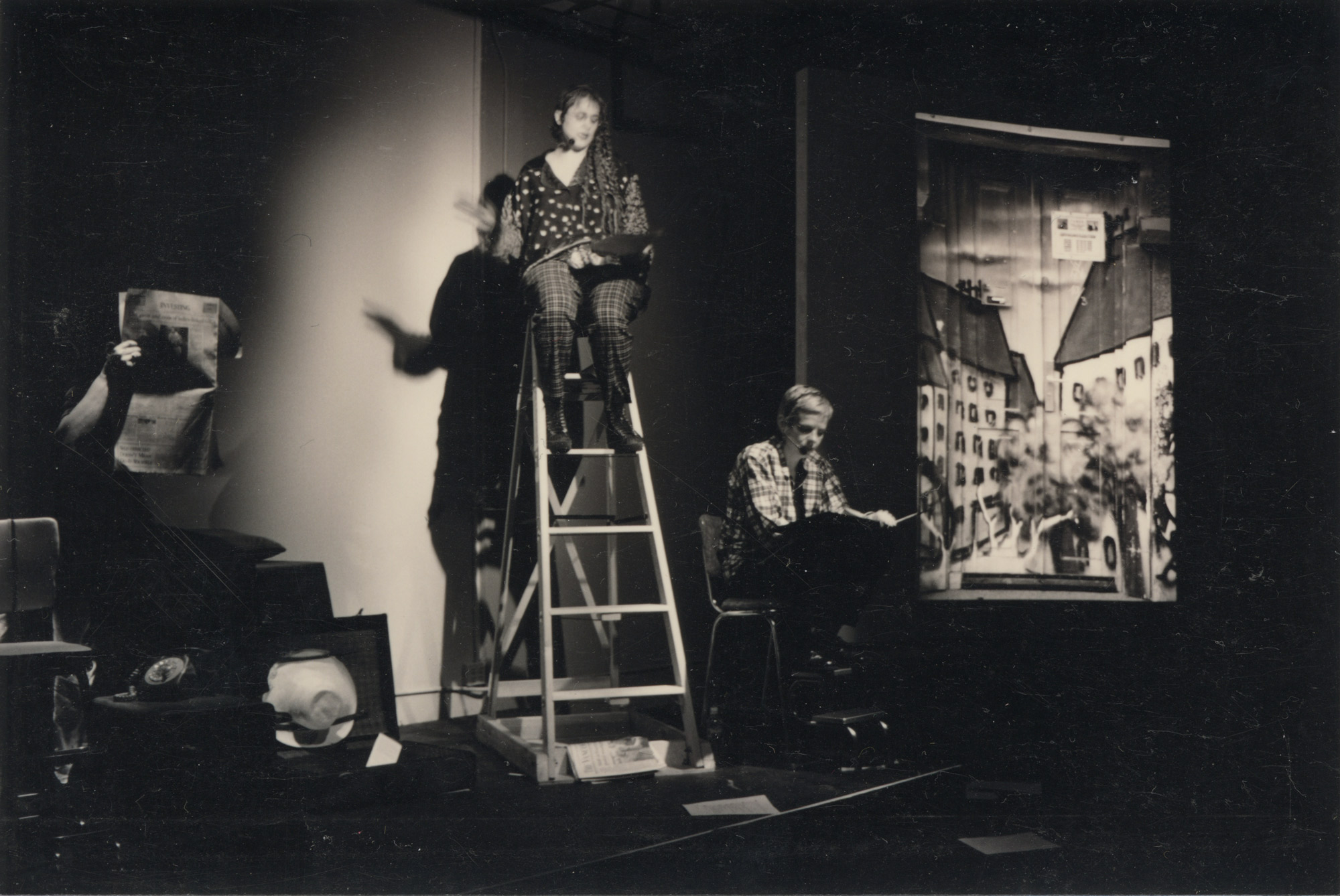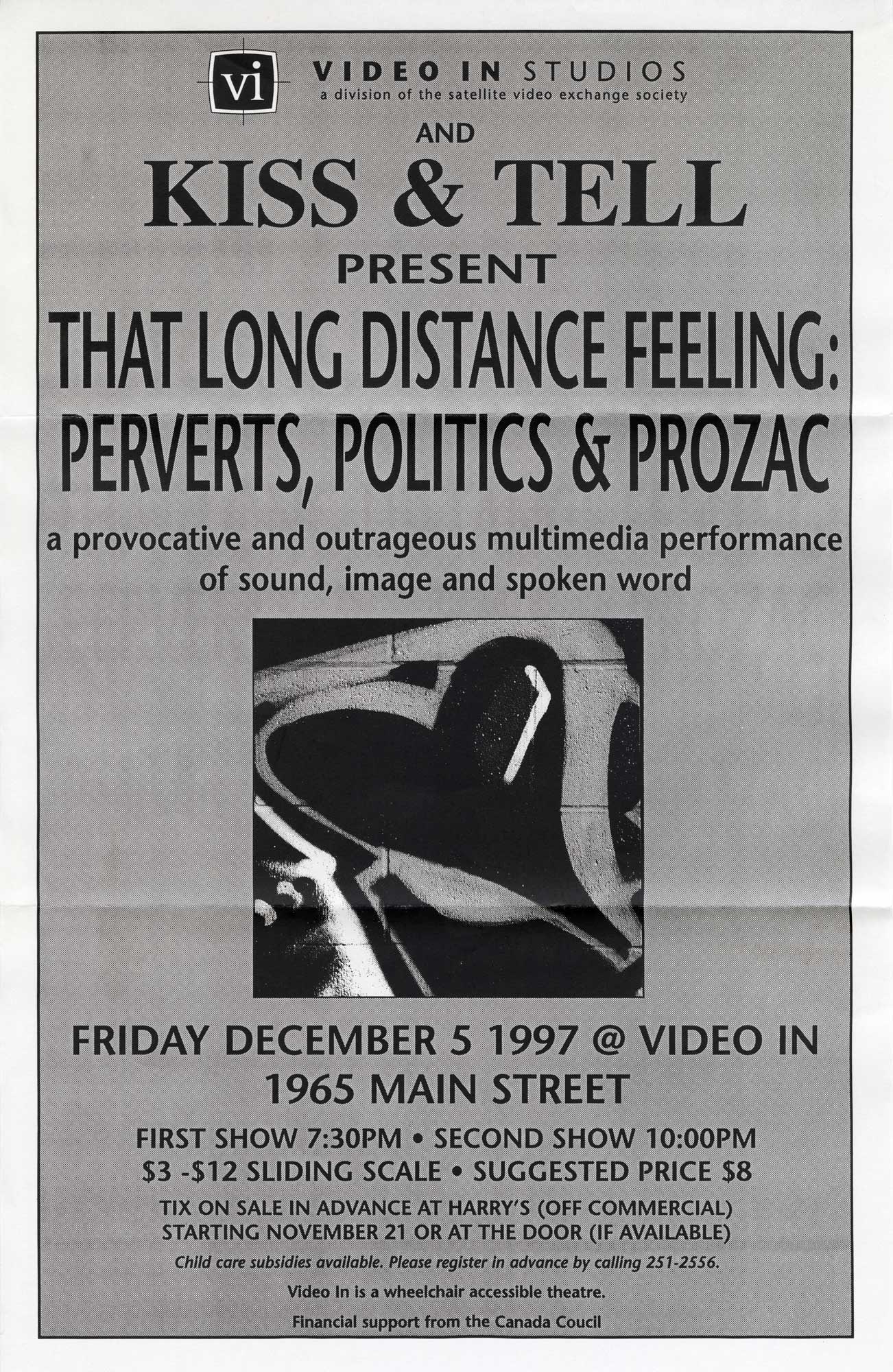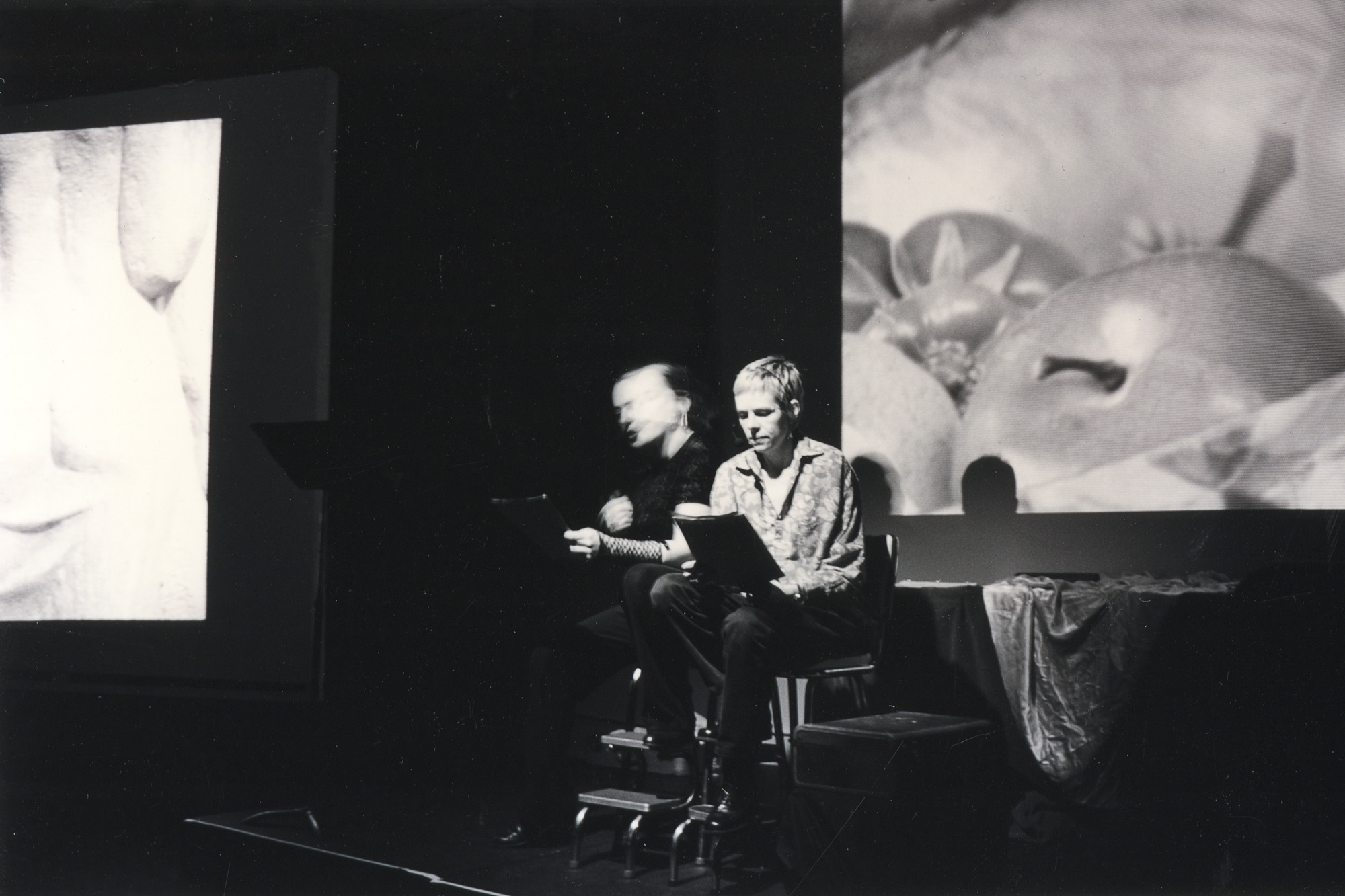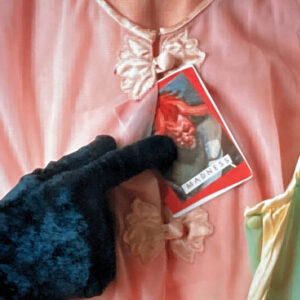That Long Distance Feeling: Perverts, Politics & Prozac 1997

Kiss & Tell, That Long Distance Feeling: Perverts, Politics & Prozac, 1997
Multimedia performance at Roundhouse Theatre, Vancouver
Simon Fraser University Library Special Collections and Rare Books, Burnaby
That Long Distance Feeling: Perverts, Politics & Prozac premiered at Vancouver’s Roundhouse Community Centre on November 8, 1997. The stage props were minimal: chairs, a bed, a ladder. Video and photographs of vegetables, fruits, flowers, graffiti, and a woman swimming were projected across the back of the stage. The soundscape included ocean, rain, and street noise. The performance weaved together the personal, political, economic, and medical with signature Kiss & Tell sexiness. Lizard Jones launched into the performance with a tale about a threesome: “When you close your eyes, all you can do is hear their sighs, their whispering, and your own jagged breath. When you close your eyes, it’s impossible to know who, what, where. It makes no difference. Abandon is the only thing.”
-
Kiss & Tell, photographic projections from That Long Distance Feeling: Perverts, Politics & Prozac, 1997
Multimedia performance
Kiss & Tell Fonds, Special Collections and Rare Books, Simon Fraser University Library, Burnaby
-
Kiss & Tell, photographic projections from That Long Distance Feeling: Perverts, Politics & Prozac, 1997
Multimedia performance
Kiss & Tell Fonds, Special Collections and Rare Books, Simon Fraser University Library, Burnaby
-
Kiss & Tell, photographic projections from That Long Distance Feeling: Perverts, Politics & Prozac, 1997
Multimedia performance
Kiss & Tell Fonds, Special Collections and Rare Books, Simon Fraser University Library, Burnaby
The first section of the work’s title refers to a series of monologues by Susan Stewart about the roller coaster of pleasures, thrills, challenges, and disappointments that comes from living apart from your love. Melancholy, despair, joy, and longing are mixed with humour: “You’ve made a commitment, and it doesn’t work…. A commitment to what? To long absence, to heartache, to loneliness? A commitment to the phone company?” As reviewer Caterina Pizanias noted, “The subtitle of the performance, Perverts, Politics & Prozac, speaks best to their commitment this time to dwell longer and more explicitly at the intersection of sexuality, class, gender, and art making.”
The performance explored the intersections between sexuality, gender, and the medical establishment’s approaches to queer women’s health. “Why do doctors always ask me if I use birth control before they ask me if I sleep with men?” asked Lizard when outlining the challenges of going to a doctor as a lesbian. She told a story about her partner, who had a child, and how doctors couldn’t get their heads around the fact that a butch lesbian could be a mother. “Sometimes I think those are the women who run screaming from the ladies’ room every time a butch dyke walks in; they’re all doctors.” This reflection led to a discussion about butch/femme identities, stereotypes, and relationships, and included a love letter written by Susan to butches. Persimmon Blackbridge, a self-identified femme, took issue with butch/femme stereotypes: “She’s such a butch—so smart, so daring, so strong. And femmes aren’t? I thought we were fighting sexism, not reinventing it. I like fucking people who fuck with the rules.” Lizard responded, “Gender is there to be fucked with.” Like queer theorists such as Judith Butler and Jack Halberstam, Kiss & Tell were before their time in pointing out that gender is performed. Gender is not necessarily tied to biological sex; rather, it is a social construct.


That Long Distance Feeling also poked fun at the anti-depressant Prozac, which was recommended to Persimmon for depression and to Lizard as a treatment for multiple sclerosis (MS). Persimmon recounted a story about going to a doctor for her depression and being told such ridiculous things as “quite a few artists seem to be bipolar.” The doctor handed her pamphlets that called depression “the common cold of mental illness” and suggested Prozac as the solution. The Kiss & Tell members took turns satirizing these types of brochures. “Prozac is supposed to give you a chattier personality,” they joked. “Shy girls find dates and job opportunities.” They questioned the drug’s side effects and mocked its supposed efficacy. Lizard said that Prozac was proposed to her as a solution for a sex drive lowered by MS, and yet “twenty percent of people who take Prozac lose their sex drive…. Not much of a solution for me…. Maybe the message is sex is only for the people who are already cheerful and physically fit. The rest of us should take our pills and go to bed alone.” These lines were tongue-in-cheek, delivered in a sarcastic and playful manner, and the audience responded with raucous laughter.
In a short monologue, Lizard talked about what artists like her could bring to a feminist, queer revolution: “Well, you know they say, every revolution needs its artists. Here we are! I really like to match it up, you know, the personal and the political.” Then, in a sing-song tone, she continued: “Arise, ye prisoners of starvation / My girlfriend’s fucking someone else. What I want to know is when we storm the presidential palace, are we going to be putting up lesbian sex photos? Because if we are, I could supply them.”
As they did with many of their performances, Kiss & Tell presented That Long Distance Feeling multiple times, and each version was slightly different as the artists tweaked the content throughout the run. There was no improvisation. What they did on stage didn’t change based on audience interactions. Their works were scripted and rehearsed, and they featured multimedia elements atypical of theatre and performance art of the era.

 About the Author
About the Author
 More Online Art Books
More Online Art Books
 Acknowledgements
Acknowledgements